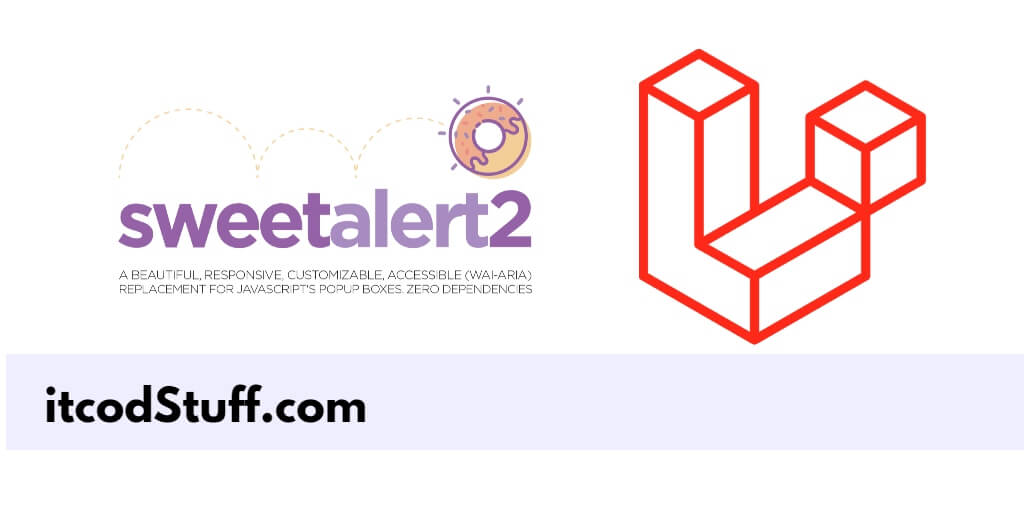SweetAlert or SweetAlert2 is a js library that allows developers to use sweetalert’s cdn on html pages and display popup messages like success, alert, error, warning to the users.
Let’s start the implementation to display a popup message on a blade view file using the sweetalert js library in laravel 11 applications:
Step 1 – Define Routes
Edit the routes/web.php file, and define routes in it to handle requests with controller:
<?php
use Illuminate\Support\Facades\Route;
use App\Http\Controllers\SweetAlertController;
Route::get('/list', [SweetAlertController::class, 'index']);
Route::post('/list/{id}', [SweetAlertController::class, 'removeData'])->name('list.removeData');Step 2 – Create Controller
Run the following command to create a controller class to handle business logic in it:
php artisan make:controller SweetAlertControllerEdit the app/Http/Controllers/SweetAlertController.php file, and in it implement the method for deleting the record along with showing the list and displaying the message on the view:
<?php
namespace App\Http\Controllers;
use App\Models\User;
use Illuminate\Http\Request;
class SweetAlertController extends Controller
{
public function index()
{
$users = User::get();
return view('list', compact('users'));
}
public function removeData(Request $request,$id)
{
User::where('id',$id)->delete();
return back();
}
}Step 3 – Create Blade File
Go to resources/views directory and create list.blade.php file, and then add the following code in it:
<!DOCTYPE html>
<html>
<head>
<title>Laravel 11 Sweet Alert Message Tutorial - Itcodstuff.com</title>
<link href="https://cdn.jsdelivr.net/npm/[email protected]/dist/css/bootstrap.min.css" rel="stylesheet">
<meta name="csrf-token" content="{{ csrf_token() }}">
</head>
<body class="bg-light">
<div class="container mt-5">
<h2 class="mb-3">Laravel 11 Sweet Alert Message Example - Itcodstuff.com</h2>
<table class="table">
<tr>
<td>Name</td>
<td>Email</td>
<td>Action</td>
</tr>
@foreach($users as $user)
<tr>
<td>{{$user->name}}</td>
<td>{{$user->email}}</td>
<td>
<button class="btn btn-outline-danger btn-sm delete-data" data-id="{{ $user->id }}" data-action="{{ route('list.removeData',$user->id) }}">Delete</button>
</td>
</tr>
@endforeach
</table>
</div>
</body>
</html>Step 4 – Add SweetAlert CDN
Edit list.blade.php file, and sweetalert cdn in it:
<script src="https://ajax.googleapis.com/ajax/libs/jquery/3.6.4/jquery.min.js"></script>
<script src="https://cdn.jsdelivr.net/npm/[email protected]/dist/sweetalert2.all.min.js"></script>
<link href="https://cdn.jsdelivr.net/npm/[email protected]/dist/sweetalert2.min.css" rel="stylesheet">Step 5 – Use SweetAlert
Use the sweetalert methods on the blade view file to show the message to the users:
<script type="text/javascript">
$("body").on("click"," .delete-data", function(){
var current_object = $(this);
swal.fire({
title: "Are you sure?",
text: "We are going to delete this user forever.",
type: "error",
showCancelButton: true,
dangerMode: true,
cancelButtonClass: 'red',
confirmButtonColor: 'blue',
confirmButtonText: 'Delete',
},function (result) {
if (result) {
var action = current_object.attr('data-action');
var token = jQuery('meta[name="csrf-token"]').attr('content');
var id = current_object.attr('data-id');
}
});
});
</script>Step 6 – Test This Application
Run the following command to start application server:
php artisan serveType http://localhost:8000/list url on browser to test this application.
